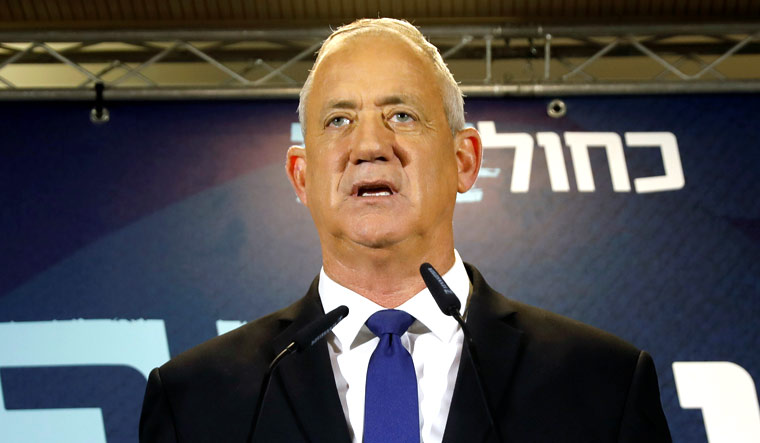Benjamin Netanyahu's main challenger Benny Gantz on Thursday presented himself as the next prime minister, hours after the embattled Israeli premier urged the Blue and White leader to join him in forming a unity government to avoid a third election.
With nearly 97 per cent of the votes counted on Thursday, Gantz's Blue and White party won 33 seats while Netanyahu's Likud secured 31 seats in Israel's 120-member Parliament.
Gantz, 60, said he intends to form and lead a "broad, liberal, unity government."
"After an election that was forced on Israel, (people) voted and made a clear choice. The people voted for unity and Kahol Lavan [Blue and White] won the election. It's the biggest party," he added.
He said the Israeli people wanted a unity government after the last election too and vowed to form a "broad, liberal unity government."
"In order to form a unity government, one can't come with political blocs and spins," Gantz said, referring to the right-wing religious bloc's move to recommend Netanyahu as the next prime minister after no clear winner emerged in the unprecedented repeat polls.
"You come with responsibility and seriousness. I attend to act accordingly," Gantz was quoted as saying by the Haaretz.
Gantz said he will not accept any dictates. "There will be no shortcuts."
His comments came after 69-year-old Netanyahu said he wanted to form a right-wing government, but the results showed it was not possible. He called on Gantz to meet him "at any hour today" in order to hold discussions for a unity government.
"Benny, it's on us to establish a wide unity government today. The nation expects us, the both of us, to work together. Let's meet today. At any time, at any moment. In order to begin this process that is demanded of us at this time," he said.
"We cannot and have no reason to go to a third election. I oppose it. The call of the hour is to form a broad unity government today," he said.
"There is no choice but to establish a wide unity government as wide as possible that's made up of all the officials that Israel called on," The Jerusalem Post quoted Netanyahu as saying.
Netanyahu recalled the unity government between Shimon Peres and his Likud rival Yitzhak Shamir that was created in the 1980s when the election results were similarly deadlocked.
"When there was no clear outcome from the Knesset elections, Shimon chose national unity. He and Yitzhak Shamir agreed to cooperate - to navigate Israel's path to safety," the Likud leader said.
He called on Gantz to follow in Peres' footsteps so that together they could similarly navigate Israel to safety, the paper said.
His statement about the Peres-Shamir cooperation was seen as a reference to a possible rotation in the Prime Minister's Office. Peres and Shamir rotated as prime ministers from 1984 to 1988, the paper added.
Blue and White, however, rejected the offer as "spin."
Earlier, the leaders of all the parties in the right-wing religious bloc on Thursday signed a document to recommend Netanyahu as the next prime minister and vowed to enter a coalition only as a single unit.
The document was signed by Netanyahu; United Torah Judaism leader Yaakov Litzman; and Yamina MKs Ayelet Shaked, Naftali Bennett, Rafi Peretz and Bezalel Smotrich. Shas leader Aryeh Deri gave his consent via phone and said he would sign the document soon.
ALSO READ
- Gaza ceasefire: How Trump envoy Steve Witkoff did more to sway Benjamin Netanyahu in one meeting than Biden could all year
- Who is Nawaf Salam? Lebanese PM-elect voted against Israel 210 times as UN envoy but why Hezbollah hates him
- How Donald Trump's threats brought Hamas to table. Most of the 33 hostages to be freed are alive, says Israel
Netanyahu called the snap election after failing to form a governing coalition with a viable majority after April's vote.
His victory in the April 9 polls securing him a record fifth term proved temporary in the face of a logjam between potential coalition partners over a military conscription bill governing exemptions for ultra-Orthodox Jewish seminary students.
With no clear winner, some analysts here see the chances of a coalition government coming in place quite bleak at the moment.
Netanyahu, who has been premier for a total of more than 13 years, faces charges of bribery, fraud and breach of trust in connection with three cases.
Israel has always had a coalition government and never seen a single-party rule since its independence. The religious parties, themselves a divided lot but definitely on the Right side of the political spectrum, have always been a part of the coalition governments except one led by Ariel Sharon.
Labour party leader Amir Peretz and Democratic List leader Ehud Barak have served in governments led by Netanyahu at different times during the last ten and a half years.


